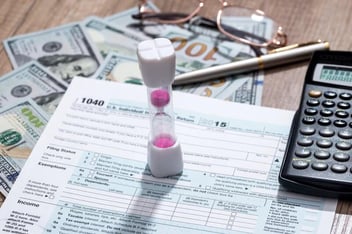Often, when you’re faced with IRS debt, there are other nasty little financial problems out there that can tend to crop up.
I have to tell you though, as I sat down to write this strategy note, it made me think about some Charlotte clients that I’ve walked with over the years who fought their way — successfully — out of debt that would have crushed other Charlotte families.
How did they do that? Today I’ll tell you.
But here’s something they did NOT do: Borrow money to pay off more borrowed money (and call it savings).
That only works for Uncle Sam, apparently.
In general, with these issues, I’m a big fan of automation — but not in all instances. For example, do NOT “automate” your tax preparation process with off-the-shelf software. Especially of the “free” variety. I hear so many firsthand stories from clients and have had to clean up so many mistakes made by these products (and their users!), that I cannot, in good conscience, recommend them.
Yes, I’m obviously biased. But the facts are the facts. Take a gander at this, for just one small example: http://www.customerservicescoreboard.com/TurboTax
Alrighty then … let’s talk about how my clients get out of debt.
How To Get Out of Credit Card Debt Fast in Charlotte: 6 Key Steps
“What simple action could you take today to produce a new momentum toward success in your life?” – Tony Robbins
The average credit card balance for an American household as of August of this year was $7,135, which is an increase over years previous and not something that any of us really would like to see increase further. And that counts the households that carry no debt, so the figure for those who *do* is even worse.
You may be in a better situation … it may also be worse. So, to answer the questions we often get around here from clients facing tough times, I’ve compiled a step-by-step process for you which often helps Charlotte folks work through significant amounts of credit card debt.
1. First, pay more than the credit card company minimums
If you only pay the minimum payment each month, your bill could continue to INCREASE, even if you completely stop using your card. This is called “negative amortization”–where you think you are paying on your debt but the additional fees and finance charges are more than the minimum payment. The bottom line is: Pay more than your minimum or you will eventually be in debt over your head. **Note: One exception to this not being the best approach is if you are in negotiations with the IRS for an Offer in Compromise or a payment plan.
2. Create an automated system to pay on time and increase your credit score
With online banking and automatic payment options, there are GREAT tools for ensuring you don’t mess up because of administrative chaos. If you feel you can’t manage all your bills by pen and paper, there are several good software programs available for keeping track of your financial records. It’s simple: Paying your credit card payment on time can increase your credit score. Missing your credit card payment can decrease your credit score.
3. Yes, you can negotiate with your credit card company
No, you do not need to be an attorney or other professional to negotiate with your credit card company (negotiating with the IRS, on the other hand, is a very different story!). The rising amount of consumer debt in this country has made creditors realize that they need to be more understanding of their customers — if they hope to get any money back. If you file bankruptcy they are only going to get pocket change at best, so they are often willing to make deals.
4. Proactively contact your creditors — in writing
Open communication always helps. Usually credit card companies get ignored and end up sending delinquent files to a collections agency. So they’ll actually appreciate your openness in contacting them, and may be more understanding of your situation. Proactively dealing with your debt problem, rather than hiding, will not only help your financial problem, but will make you feel better about yourself as well.
5. Develop a simple tracking system
If you are not able to pay the full amount of your credit each month, you should still pay something to stay on top of it. You should work off of a written budget so you know exactly where you stand. Some experts suggest that you divide your monthly debt budget by the percentage each bill makes of the total and pay that amount.
Here’s an example of what these experts advise: If you owe a total of $1,000, and one credit card is $800 and the other is $200, and you only have $100 available to pay for that month… You could pay $80 on the $800 balance, and $20 on the $200 balance. This way you are reducing each debt by the same percentage.
6. Do NOT be intimidated
No matter how forthcoming and honest you are, some creditors have been taught to be mean and downright nasty. Hang in there, and don’t let their tactics intimidate you.
Warmly,
Sara F Gonzalez, CPA, CTC, CTRS
(844) 599-3355
KG Tax Resolution Services



